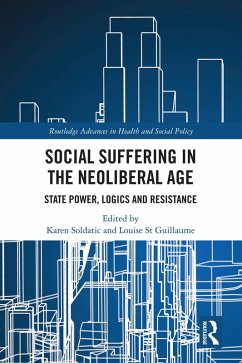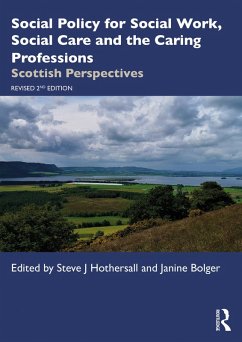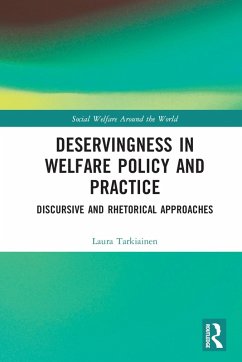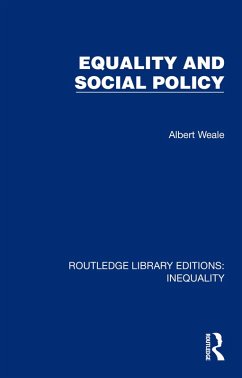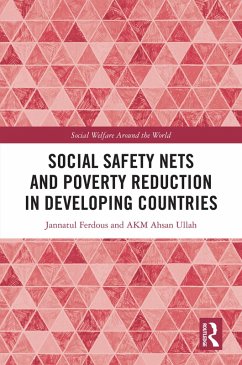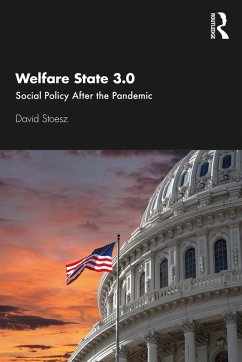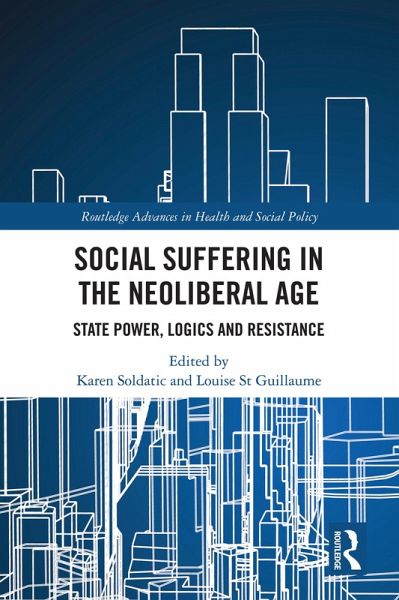
Social Suffering in the Neoliberal Age (eBook, ePUB)
State Power, Logics and Resistance
Redaktion: Soldatic, Karen; St Guillaume, Louise
Versandkostenfrei!
Sofort per Download lieferbar
41,95 €
inkl. MwSt.
Weitere Ausgaben:

PAYBACK Punkte
21 °P sammeln!
This book provides a rich synthesis of research and theory of nascent and emergent critically engaged work examining changing welfare structures, regimes and technologies and the social suffering that is generated in everyday lives.By rigorously examining social security restructuring with the turn to austerity governance and its daily practices of managing, regulating and subordinating individuals, peoples and communities, this collection delineates the machinery of state power and logics designed to manage, contain and control the lives of some of the most poorest and marginalised citizens w...
This book provides a rich synthesis of research and theory of nascent and emergent critically engaged work examining changing welfare structures, regimes and technologies and the social suffering that is generated in everyday lives.
By rigorously examining social security restructuring with the turn to austerity governance and its daily practices of managing, regulating and subordinating individuals, peoples and communities, this collection delineates the machinery of state power and logics designed to manage, contain and control the lives of some of the most poorest and marginalised citizens who are reliant on social welfare income payments. A core strength of the book is, first, its unpacking of austerity governance across diverse communities and, second, the elevation of community resistance and mobilisation against the very measures of austerity. Combined, the work maps out the logics of state power and everyday practices of embedded contestation and confrontation.
Using the case study of Australia to discuss sociolegal recategorisations, automation of welfare governance, technologies of policy design and delivery, conditionality and systems of penalisation, this book will be of interest to all scholars and students of sociology, critical theory, social policy, social work and disability studies, Indigenous studies and settler-colonialism.
By rigorously examining social security restructuring with the turn to austerity governance and its daily practices of managing, regulating and subordinating individuals, peoples and communities, this collection delineates the machinery of state power and logics designed to manage, contain and control the lives of some of the most poorest and marginalised citizens who are reliant on social welfare income payments. A core strength of the book is, first, its unpacking of austerity governance across diverse communities and, second, the elevation of community resistance and mobilisation against the very measures of austerity. Combined, the work maps out the logics of state power and everyday practices of embedded contestation and confrontation.
Using the case study of Australia to discuss sociolegal recategorisations, automation of welfare governance, technologies of policy design and delivery, conditionality and systems of penalisation, this book will be of interest to all scholars and students of sociology, critical theory, social policy, social work and disability studies, Indigenous studies and settler-colonialism.
Dieser Download kann aus rechtlichen Gründen nur mit Rechnungsadresse in A, B, BG, CY, CZ, D, DK, EW, E, FIN, F, GR, HR, H, IRL, I, LT, L, LR, M, NL, PL, P, R, S, SLO, SK ausgeliefert werden.




